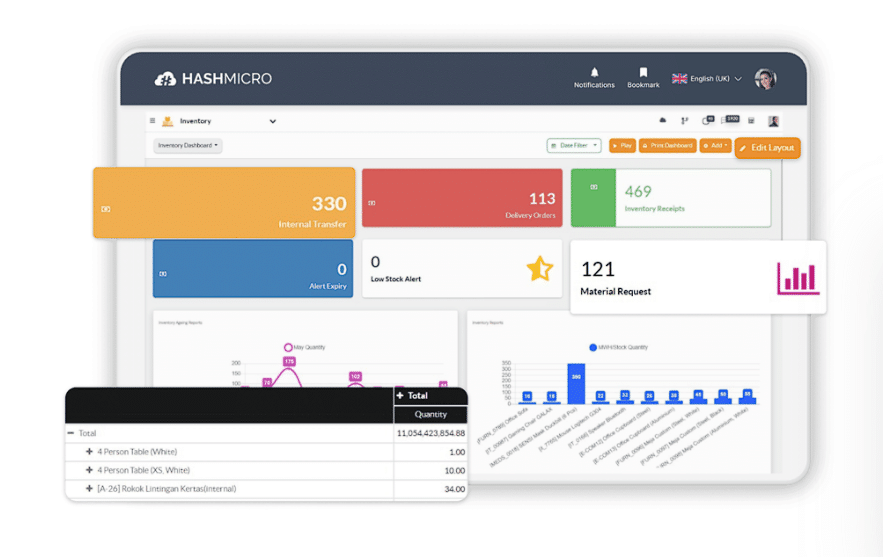Have you ever faced challenges in managing inventory effectively as a manufacturer in Singapore’s thriving industrial landscape? For many manufacturers, the complexities of inventory control often pose significant hurdles, impacting production efficiency, costs, and overall business performance.
In a competitive market like Singapore, where efficient resource allocation is vital for sustained growth, the need for streamlined inventory management practices becomes paramount.
If you feel that way, then you’re in the right place right now! In this article, we will explain 8 inventory management hacks. So, you can improve your inventory management software efficiency in Singapore.
Key Takeaways
|
Table of Content:
Table of Content
1. Set up Minimum Inventory levels
Make industrial inventory management easier by setting up “par levels” or the minimum amount of inventory necessary to be on hand at all times. When certain items reach or approach predetermined minimum levels, you know it’s time to reorder.
Ideally, you will order items in a sufficient amount to exceed the minimum levels. The minimum inventory levels will vary by product, depending on how quickly the product sells and how long it takes to get the product.
The best way to maintain inventory levels is to take inventory management software like those designed for specific industries, including industrial inventory management for salons and spas.
These specialized software systems not only ensure optimal stock levels but tailor their functionalities to manage the unique inventory needs of salons and spas – like managing different beauty products, tracking their usage, expiry, and restocking needs.
2. Conduct Demand Forecasting
You need to forecast the demand for your products to find out the amount of inventory that should be on hand at all times, and avoid unnecessary procurement, overstock, and stockouts.
Manufacturers can conduct demand forecasting in several ways by involving internal and external factors such as:
- Market trends
- Sales data for the previous year
- This year’s growth rate
- Overall economic conditions
- Upcoming promotions
- Expenditures for planned advertisements
When you use historical sales data, it is important to make sure that the data generated is complete and accurate, so there are no mistakes while performing forecasting. A sophisticated manufacturing inventory management system has a forecasting feature that allows you to generate forecasts that help you make the right decisions for future purchases.
Want to explore these advanced features and pricing? Click the banner below to check out HashMicro’s pricing plans and optimize your industrial inventory management!
3. Use FIFO Method
First-in, first-out (FIFO) is a critical principle of manufacturing inventory management. It means that your oldest stock (first-in) must be sold first (first-out), instead of your latest stock. This is especially important for easily damaged goods so you will not end up with unsaleable items.
The FIFO principle can also be implemented on non-perishable products. If the same items are always put at the back, they tend to get obsolete faster. You certainly don’t want to sell something outdated or not worth selling.
To apply the FIFO principle, you need a well-organized warehouse by adding new products from the back or making sure your old products stay at the front.
4. Audit & Conduct Regular Inventory Inspections
Reviewing and conducting regular inventory audits is the best way to find potential problems before they occur. Ideally, manufacturers audit and do regular inventory inspections every month to cover their entire base.
The easiest way to validate your data is to rely on inventory management software and generate reports to find out how many products you have. However, it is important to ensure that the quantities recorded by the system match the physical count of goods on hand.
There are several inventory audit methods you can use:
1. Physical inventory
Physical inventory means counting all your inventory at once. Many businesses do this at the end of the year because they are related to accounting and filing income tax.
Physical inventory can be very disruptive to business processes even though manufacturers do it usually once a year. It is considered to be less efficient compared to other methods. If you find a discrepancy, it may be difficult to identify the issue, since you have to look back at an entire year.
2. Spot checking
If you do a full physical inventory at the end of the year and you often experience problems, or you have too many products, you might want to start spot-checking throughout the year.
This means choosing a product, calculating it, and comparing the number calculated to what it’s supposed to be. This does not need to be done on a schedule and is supplemental to physical inventory.
3. Cycle counting
Instead of doing a complete physical inventory, some businesses perform cycle counting to audit their inventory. Rather than doing a full count at the end of the year, you can conduct cycle counting to reconcile the number of products listed on the system and the actual number of products throughout the year.
Manufacturers can conduct cycle counting whenever needed; every day, week, or month. Different products are checked in turns according to the specified schedule. There are various methods of determining the number of times a product has to be counted, however, higher-value products are usually counted more frequently.
5. Use ABC Analysis
Some products need more attention than others. Use ABC analysis to prioritize your inventory management. Separate products that require a lot of attention from those that don’t.
Do this by reviewing your product list and adding each product to one of the following three categories:
A – high-value products with low sales frequency
B – moderate value products with moderate sales frequency
C – low-value products with high sales frequency
Products in category A need more attention because the financial impact is significant, but the sales are unpredictable. Meanwhile, products in category C require less supervision because they have a smaller financial impact and they are constantly turning over. Products in category B fall somewhere in between.
6. Manage Good Relationships with Suppliers
Establishing good relationships with suppliers is a great way to keep your inventory under control. This way, your suppliers will be more willing to work with you to solve any problems related to your inventory management for manufacturing companies.
Having good relationships with your suppliers will be very helpful. Manufacturers can negotiate minimum order quantities. Don’t be afraid to ask for a lower minimum so you don’t have to keep as much inventory. Managing relationships with suppliers is possible by adopting a supply chain management system.
A good relationship is not just about being friendly. It’s also about good communication. Let your suppliers know when you’re expecting an increase in sales so they can adjust the supplies to your production planning.
Ask them to tell you when there are certain products that they cannot deliver quickly so that you can delay the production and promotion time for the product.
7. Supplier Collaboration and Relationship Management
Establishing robust collaboration and nurturing relationships with suppliers is pivotal in the realm of inventory management for manufacturers.
By forging strong ties with trusted suppliers, manufacturers can optimize their inventory processes extensively. A key advantage of this collaboration is the ability to enhance lead times and ensure timely deliveries.
This cooperative relationship allows for streamlined communication, enabling manufacturers to share crucial information such as sales data, demand forecasts, and production schedules with suppliers.
This exchange of data fosters better inventory planning and enables suppliers to align their production and delivery schedules accordingly. Consequently, manufacturers can reduce the likelihood of stockouts or excess inventory, ensuring a more efficient inventory management system overall.
Moreover, negotiating favorable terms with suppliers, such as flexible delivery schedules or pricing arrangements, can contribute to cost savings and improved operational efficiency for manufacturers in Singapore.
8. Implement RFID Technology for Inventory Tracking
Implementing Radio-Frequency Identification (RFID) technology presents a transformative approach to inventory management, especially in manufacturing. RFID tags serve as digital identifiers, storing unique information about individual products, components, or raw materials.
These tags use radio waves to transmit data wirelessly to RFID readers or antennas placed strategically throughout the production line, warehouse, or storage areas. This technology enables manufacturers to seamlessly track inventory movements in real time as items traverse various production stages or storage locations.
Unlike traditional barcode systems, RFID doesn’t require line-of-sight scanning and allows for bulk scanning of items, significantly reducing the time spent on inventory checks and manual data entry.
Moreover, RFID enhances accuracy by mitigating human errors, ensuring precise inventory counts, and reducing the likelihood of stock discrepancies or misplaced items. Integrating cloud based inventory solutions further amplifies these benefits by providing centralized access to real-time inventory data, allowing stakeholders to monitor stock levels and movements from anywhere.
The instantaneous and accurate visibility into inventory levels empowers manufacturers to make informed decisions promptly, facilitating optimized resource allocation, streamlined production schedules, and improved order fulfillment.
By leveraging RFID technology, manufacturers in Singapore can streamline their operations, minimize inventory holding costs, and foster a more agile and efficient manufacturing ecosystem.
Improve Inventory Management Efficiency with HashMicro’s System
Integrated with inventory management system from HashMicro is one of the effective solutions that can help you to improve inventory management efficiency.
This system is specifically designed to help users manage inventory with a variety of comprehensive features. In addition, the system also offers a free demo that you can access at any time to understand how the system works.
Here are the features of the HashMicro inventory management system that make it the best choice you can make:
1. RFID Warehouse rack stock in out automation: Automates the tracking of stock in and out movement on warehouse racks, improving efficiency and accuracy of inventory management
2. 3D Warehouse: Helps to make goods placement planning, space optimization, and logistics problem detection.
3. Stock Forecasting: Proactively reorganize stock, optimize inventory levels, and improve customer satisfaction.
4. Run Rate Reordering Rules: Forecasting product quantities based on market trends and ensuring the warehouse has enough items to meet demand without overstocking or understocking.
5. Fast Moving Slow Moving Stocks Analysis: Analyze historical data related to stock items in the warehouse to identify fast moving slow moving items in the inventory.
Conclusion
To be able to streamline inventory management, there are several steps you can take, such as use fifo method, use ABC analysis, set up minimum inventory levels, conduct demand forecasting, audit & conduct.
Although, these steps can improve the efficiency of inventory management, mismanagement is still prone to occur. Especially if you manage manually. Therefore, integrating with HashMicro’s inventory management software is a solution that you can do.
This manufacturing inventory management allows you to track your product journey from one warehouse or outlet to another. Increase your accuracy in tracking products, and reduce the chance of delaying production.
This is the greatest hack you can implement easily. These hacks need to be implemented to optimize your inventory management for manufacturing. Get free demo now by clicking here to get trial!
FAQ About Inventory Management Hacks
What are some effective manufacturing inventory management hacks for reducing excess stock?
Implement strategies like ABC analysis to categorize inventory, optimize reorder points using historical data, and establish a just-in-time (JIT) inventory system. Utilize cycle counting to regularly audit stock levels and minimize excess inventory.How can I improve inventory accuracy without investing in expensive technology?
Employ simple but effective methods like regular cycle counts, standardization labeling and barcoding, and ensuring a structured layout for your warehouse or storage space. Train staff on accurate data entry and inventory tracking practices.What are efficient ways to streamline order fulfillment and improve order accuracy?
Integrate an order management system with real-time inventory tracking to ensure accurate stock availability. Optimize picking routes, use batch picking for similar items, and employ packing stations to streamline the fulfillment process.What inventory management hacks can help optimize storage space utilization?x
Implement space-saving techniques such as vertical storage, standardization container sizes, utilizing bin locations, and employing FIFO/LIFO methods to ensure older stock moves first, preventing obsolescence.How can I prevent stockouts and overstock situations using inventory management hacks?
Leverage demand forecasting techniques to anticipate future needs accurately. Utilize buffer stock strategies to manage unexpected demand spikes and maintain safety stock levels without risking overstocking.





































